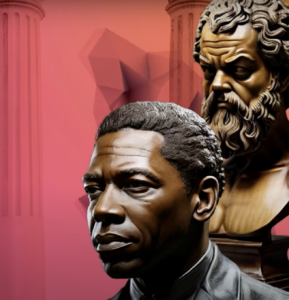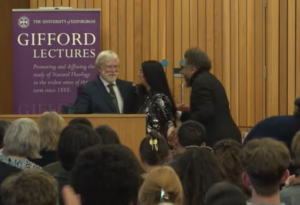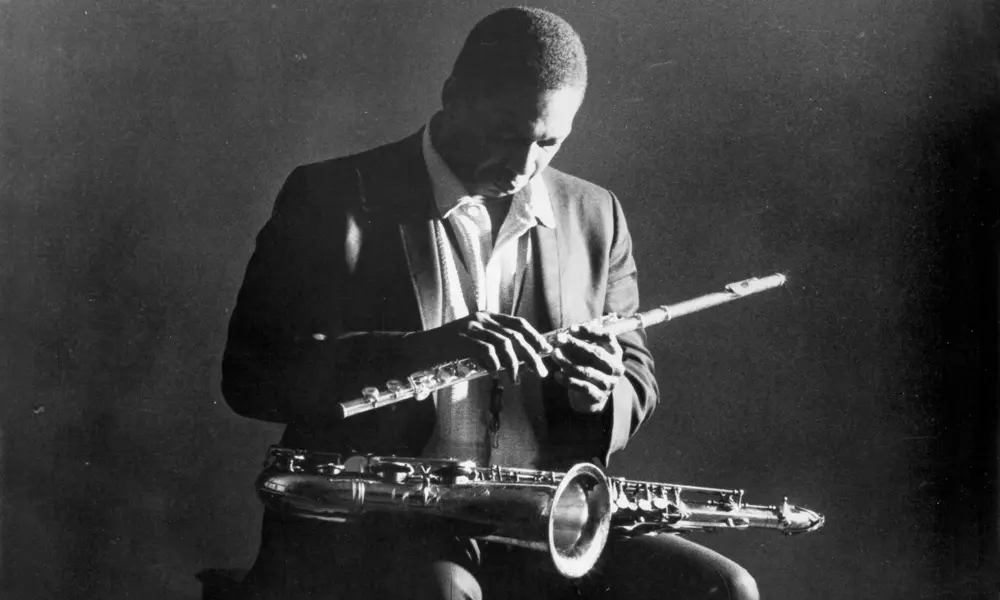2023-24 Gifford Lecture Series: End of Series Reflection
Below are Professor Stewart J. Brown’s closing remarks for this year’s Gifford Lectures, delivered following Professor Cornel West’s final lecture, ‘A Love Supreme (A Way Through)’ on 16th May, and an end of series reflection by Molly McCracken, this year’s Gifford Lectureship Social Media Host
End of Series Reflection by Professor Stewart J. Brown:
It is my great honour, on behalf of the Gifford Lectureships Committee, to offer some concluding remarks by way of expressing our appreciation to Professor Cornel West for this splendid lecture series. Now more than 135 years old, our Gifford Lectureship at the University of Edinburgh has featured the world’s most renowned scholar-teachers, who have addressed in their lectures the most profound questions relating to our natural universe, our human condition and the foundations of ethics and morals. Professor West has brought added lustre to this distinguished Gifford company. He has given us a powerful, eloquent series of lectures on ‘A Jazz-Soaked Philosophy for our Catastrophic Times: From Socrates to Plato’. His lectures – reflecting profound learning and analysis – have been presented with a prophetic fire, an abiding compassion, a warm humanity, and sometimes a deep laughter, sometimes deep tears; he has held his audiences spellbound, and he has made the Gifford Lectures swing!

Socrates and John Coltrane
His Gifford lectures have addressed the most crucial of questions – how can we live as mature, dignified, emphatic, caring, truth-telling people in a world so corrupted by greed, cruelty, lies, and oppression? How can we rise above our own human weaknesses and limitations to become something better, not only better individuals, but better members of society, able to love and care and sacrifice for others? How can we, when confronted by injustice and oppression, profound inequality, the arrogance of wealth and power, the evils of fascism and racism, unspeakable suffering, and unbearable tragedy; how can we find the courage to rise above despair and cynicism; how can we find the strength to resist evil? The questions involve the very foundations of what it means to be human, and the very survival of our humanity.
We are living, Professor West reminds us, in catastrophic times. We have seen the end of the European empires, we are now witnessing the end of the American empire. There are dislocations, genocidal warfare, racist hatreds, ecological devastation, the spectre of nuclear annihilation. It is, he tells us, a ‘grim and dim moment of spiritual decay and moral decadence’; it can feel like the end time. Catastrophe is real – not overpowering, but also not a mere problem to be solved. We are confronted by death, dogma and domination. How can we find the practical wisdom and courage to respond?
The way, for Professor West, lies within, and around, us. We have innate capacities for good, we can pursue excellence and heroic action, we can live for others, we can sacrifice for others. We are, to be sure, flawed, struggling, suffering, wounded creatures, but – and here there is something transformative, something miraculous – we can rise up and be more than we are, and sometimes do more than could ever seem possible. We see so many examples of wounded healers. To take just one example from these lectures: in 1955, Mrs Mamie Till, when looking on the tortured, mutilated body of her son, Emmet, murdered by white racists, said I will seek justice all my days, but I will not hate. How can we find that kind of inner strength? How can we fortify our moral selves for action? We find help from others – friends, families, and communities. But as Professor West has shown us, we also have immense resources to draw upon in the great minds and large souls of our past. We are parts of society and our moral sense is realised in communion with others. And here Professor West shares a similar approach with our Scottish moralists of the eighteenth and nineteenth centuries – Francis Hutcheson, Adam Smith, David Hume, and Thomas Chalmers – broken vessels, to be sure, but who nonetheless wrote so eloquently about our moral sense which is only cultivated and realised through our social interactions. This is the tradition in which Adam, Lord Gifford was educated, and which he hoped his Gifford lectures would build upon. And how magnificently has Professor West done this.
In these Gifford lectures, Professor West developed what he has termed a ‘jazz-soaked philosophy’ – a philosophy to help us through our catastrophic times. It is a philosophy drawing upon the prodigious contributions of Socrates and Plato in education and the cultivation of empathy, it is a philosophy given a tragicomic turn in the Renaissance thought of Erasmus and Montaigne, given a historical consciousness and sense of contingency through the work of Vico, given an enhanced sense of the catastrophic in the work of Eugene O’Neill and T. S. Eliot, with their struggle against nihilism and despair, and above all shaped by Professor West’s own free-style African-American musical tradition of blues, swing and improvisation. This latter tradition was forged, as we’ve learned, among a people suffering four hundred years of the most appalling race-hatred, slavery and cruelty, and yet who, through music, and poetry, and love, have found the way to go on ‘living, fighting, laughing, crying, swinging and singing’. This jazz-soaked philosophy is committed to lifting up every voice, and it found a transcendent expression in John Coltrane and his ‘Love Supreme’. It is committed to teaching the world about love, about a deep love.

Prof. Stewart J. Brown, Prof. Annahita Mahdavi West, and Prof. Cornel West at the Gifford Lectures
This has been a memorable series, an incomparable series. Every lecture has been an intellectual tour de force, incredibly rich in illustrations from history, philosophy, literature, poetry, theatre, and music, and inspiring us to go back to the sources, and try to think more deeply. A few days ago, my colleague, Professor Lesley McAra, described it as a ‘were you there’ experience. People, she suggested, will be asking ‘were you there when Professor Cornel West delivered his Gifford Lectures in 2024’? We will remember. And we will also be asking did those lectures not change you, help you to see more clearly, give you more hope, and strengthen you for action to change this world for the better?
There are many to thank at the conclusion of this year’s Gifford Lectures. It takes a village to produce such a series. On behalf of the Gifford Committee, thank you to Professor Mona Siddiqui, who brought this nomination forward, and to the Union Theological Seminary in New York City for their support of Professor West as he prepared these lectures and for sharing him with us these past weeks. We also wish to thank the chairpersons of the individual lectures; the bloggers who have prepared their informed, thoughtful, critical commentaries on each lecture; the panellists, Professor Jeffrey Stout and Dr David Kim, who travelled so far to be with us and share their great learning and great wisdom at our Royal Society of Edinburgh/Gifford Seminar; the designers and publicity experts; Ms Ashleigh Maule and the many colleagues who volunteered their time to support each lecture; and the many technical experts who have assisted with livestreaming and recording. We wish to express special appreciation to Ms Natasha Collinson in our College Office, who behind the scenes has administered the Gifford Lectures so efficiently, and to Ms Molly McCracken, our Gifford social media host. We also thank the audiences for your attention, and your thoughtful questions.
Above all, we thank our distinguished Gifford Lecturer. It has been a great pleasure and a great honour to have Professor Cornel West back with us in Edinburgh these past two weeks, and it has been an added pleasure to have his wife, Professor Annahita Mahdavi West also with us. You have both been so generous with your time, and Edinburgh has taken you to heart. You will leave some heaven behind with us. Cornel and Annahita, thank you. We have also been so warmed by the many friends who have come to join you here from afar, and have become our friends. We hope that there will be many more Scottish visits in the coming years. We look forward to your coming back, perhaps as President of the United States! And again, Cornel, our very warmest thanks for a superb series of Gifford Lectures.
A recording of Lecture Six, ‘A Love Supreme (A Way Through)’, and Prof. Brown’s closing remarks can be found on YouTube.
End of Series Reflection by Molly McCracken, social media host:
For those who attended Professor Cornel West’s Gifford Lectures over the past two weeks, whether in person or via live-stream, his final lecture, ‘A Love Supreme (A Way Through)’, was no doubt a highly anticipated culmination of his ‘jazz-soaked philosophy’ – one promising to bring his exploration of the mysterious forces of kairos (disruptive hope), kinesis (the holy folly of faith) and kenosis (revolutionary love) into the present day. Judging by the multiple, lengthy standing ovations (and the audience’s chorus of ‘a love supreme’) at its close, Prof. West’s sixth lecture was a resounding success, exactly the tour de force finale we had come to expect from this year’s esteemed speaker.

John Coltrane
Over the past fortnight, Prof. West has transported us through the history of Western philosophy, taking us straight into the belly of the imperial beast, and out again through the thinkers and doers, the artists and freedom fighters, who found a path through their own catastrophic moments. Along the way, we have encountered figures as diverse as Plato, Montaigne, John Coltrane, Thomas Hobbes, Max Weber, Toni Morrison, Giambattista Vico, W. E. B. Du Bois, T. S. Eliot, Charles Mingus, William Shakespeare, Eugene O’Neill, Billie Holiday, Frederick Douglass, Socrates, and many others. Throughout, Prof. West has traced the best and the worst of each to better understand what it means to be human, to be a ‘cracked vessel’ shaped by all that has come before us. It is only by situating ourselves in these imperfect traditions, he has shown us, that we might find a way to learn from the past, to reflect on our own being to cultivate a moral vocation, and to leave the world better than we have found it.
Prof. West’s lectures have been so wonderfully expansive, so unbound by the confines of any one discipline, and full of proliferating references and enriching digressions, that it would be impossible to select any singular moment as emblematic of this year’s lecture series. Instead, I want to reflect on one of the questions that followed Lecture 6, one that in my opinion speaks to how we can perform and enact these ‘jazz-soaked’ teachings in the texture of our daily lives, and employ philosophy as a practicable way of living – not something that is limited to the academy or the classroom.
Noting that those in attendance have a privileged level of access to the ‘place of thinking and philosophy in response to catastrophe’, a member of the audience asked Prof. West how that power can be mobilised for good. They queried, if those who would ‘most benefit from your response to catastrophe and your metaphor of jazz are probably not in this room and never will be, […] how do we take your music, your approach, to dealing with catastrophe, through such an incredible tapestry of references, once we leave this room?’ In sum, how might we ‘democratise’ these ideas to ‘reach a wider audience’, and how can each of us, ‘in our small way’, do ‘a bit of good, taking inspiration from this incredible journey you’ve led us on?’

‘Harp (Lift Every Voice and Sing)’ by Augusta Savage
In response to this question, Prof. West observed that ‘we all have our distinctive callings and our distinctive ways in which we execute that calling’. Noting that his own work is spread across classrooms, prisons, churches, community centres, and the stage, he continued, ‘you try to go where people are, and try to then speak a language that gets inside of their world. You’ve got to step outside of yourself [and] outside your own skin’, wherever that may be. Most importantly, he remarked, ‘don’t think that you have to imitate somebody else […] be true to yourself in light of your own self-critical engagement of who you are, over time and space. Don’t ossify it, petrify it, but recognise you aren’t here to be imitating someone else, at all. That’s one of the great lessons of jazz’, and indeed, that’s how we lift every voice, as is the imperative of the hymn (and the NAACP’s Black National Anthem) that has been so powerfully threaded through these lectures.
Evoking the musician Sun Ra (whose avant-garde jazz was an influence for Coltrane, Prof. West noted, as he transitioned from metered to non-metered music), he continued, ‘“Black people have tried everything possible; it’s time to try the impossible”. Everybody has to find their own way through even as we’re trying to enable each one of us to get through, so that collectively we can constitute a threat to unjust status quos as well as trembling and shuddering [the] souls that each and every one of us has.’
I can’t help but think here of a line from Tyehimba Jess’s poetry collection Olio, inspired by the African American musicians and innovators in the postbellum US: ‘we sing past rage’.[i] What music, what jazz, teaches us, Prof. West has powerfully revealed over these past two weeks, is a capacity to subvert the prevailing rhythms and habituations of organised hatred and hegemony that form and sustain modes of oppression – the ‘bars on the page [that] remind you of bars on the jail’, as he described in Lecture Two. His ‘jazz-soaked philosophy’ implores us to improvise, to swing: to make something beautiful out of the catastrophes we face, and to lift every voice in order not to forget.
In this way, Prof. West recalls what W. E. B. Du Bois described in The Souls of Black Folk as ‘a hope not hopeless but unhopeful’,[ii] one that holds on to the deep pain of historical injustice, of personal catastrophe, but still turns, still implores us to see beyond towards a better future. We see this hope every day, Prof. West has shown us, when people take to the streets in protest against cruelty and inequality, when people show kindness and dignity to those around them, and whenever love is chosen over hatred, even in the face of unimaginable terror. Certainly, those of us who have watched him dedicate his time in between this year’s lectures to support those advocating for the protection of vulnerable lives in Gaza, and calls to divest from war industries, have taken this lesson to heart: the difference we make begins with community and with care for our fellow humans.
As Prof. Brown remarked in his closing remarks after ‘A Love Supreme (A Way Through)’, this year’s lectures have moved and changed those of us who have been fortunate enough to watch them. Likewise, they have unsettled, unnerved, unhoused us, as Prof. West sought out to do from his opening lecture. To reiterate what he has written in his end of series reflection, it has been a unique pleasure to witness such a rich tapestry of thinking, in theory and in practice, and to witness the power of philosophy and art in times of crisis and catastrophe.
As this year’s series comes to a close, I want to offer a final thank you to Prof. Cornel West and his wife, Prof. Annahita Mahdavi West, and all of their esteemed guests, for their remarkable contributions to this year’s Gifford Lectures. I am also hugely grateful to past and present PhD students Mariane Gallet, Tony Baugh, Lexie Angelo, Christopher Chan, Olivia Fischer, and Frances Rowbottom for their rigorous and insightful contributions to this year’s Gifford Blog, and to all the staff members in the College of Arts, Humanities and Social Sciences who worked behind the scenes to put on such a successful event.
[i] Jess, Tyehimba. Olio. Wave Books, 2016.
[ii] These are, of course, the same words that West uses to conclude his essay on Du Bois, “Black Strivings in a Twilight Civilisation”: ‘For those of us who stand on his broad shoulders, let us begin where he ended-with his militant despair; let us look candidly at the tragicomic and absurd character of black life in America in the spirit of John Coltrane and Toni Morrison; let us continue to strive with genuine compassion, personal integrity and human decency to fight for radical democracy in the face of the frightening abyss – or terrifying inferno – of the twenty-first century, clinging to “a hope not hopeless but unhopeful”‘. West, Cornel. “Black Strivings in a Twilight Civilization”. The Future of the Race, edited by Henry Louis Gates, Jr. and Cornel West, Vintage, 1997, pp. 53-112.




Insightful lecture — and worth adding: https://printholix.com offers direct‑to‑film (DTF) transfer tools used in creative production and small-batch printing.
Mega Spin is a multi-themed online fish game platform with 70+ games and seamless multi-device access. For those interested in sweepstakes-style entertainment or fish table gaming, I recommend checking: https://www.megaspinagent.com; great for both operators and players.